Victoria records 363 new cases, face masks to become mandatory in locked-down areas
Dad-to-be shares terrifying story as his pregnant partner fights for life in hospital after contracting coronavirus. Melburnians will be made to wear face masks in public and at work as COVID-19 continues to spread across the city, with three more Victorians dying and 363 new cases recorded in the past 24 hours.
Coronavirus
Don't miss out on the headlines from Coronavirus. Followed categories will be added to My News.
This coronavirus article is unlocked and free to read in the interest of community health and safety. Get full digital access to trusted news from the Herald Sun and Leader for just $1 for the first 28 days.
Residents of locked down areas in Victoria - including all of metropolitan Melbourne - will face fines if they don’t wear a face mask in public from Wednesday night.
Three more Victorians have died from coronavirus, with 363 new cases recorded on Sunday.
Residents of Melbourne and Mitchell Shire will be made to wear face masks when in public and at work.
The new rule will be enforced from 11.59pm on Wednesday.
Anyone defying the rule will face a $200 fine.
The state’s chief health officer said Victoria was on a numbers “rollercoaster”.
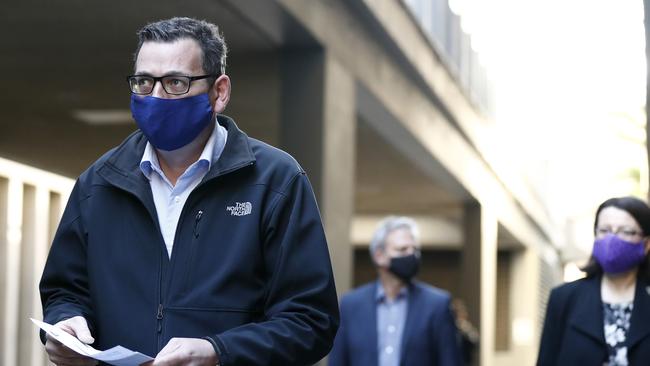
Of the new cases, 327 are under investigation while 36 were linked to known outbreaks.
There are 2837 active cases in Victoria.
There are 130 Victorians in hospital with the virus, 28 in intensive care.
Two men in their 30s are the latest coronavirus patients to be sent to intensive care in Melbourne
Figures released by the state government on Sunday also included two women and a man in their 40s, seven people in their 50s and eight in their 70s.
A further two were aged 80 or older.
It comes as Victoria recorded three more deaths overnight, two of those from aged care homes.
The three latest deaths, two men in their 90s and a woman in her 90s, bring the total to 38 in Victoria since the pandemic began.
Two of the latest fatalities were aged care residents.
It comes as a Melbourne woman who is pregnant with twins is fighting for life in hospital after she contracted COVID-19.
The woman’s partner said Kaillee Dyke was 27 weeks pregnant when she became “very sick” and was admitted to the Royal Melbourne Hospital ICU.
Dad-to-be Chris Lassig said the pair both contracted the virus, but Ms Dyke may have been more vulnerable because of her pregnancy.
He shared video of the woman struggling to breathe with the aid of a ventilator as well as an ultrasound of his unborn son and daughter, in a heartfelt post on social media.
“She’s slowly making progress, breathing more and more by herself with the machine only providing back-up,” he said.
The concerned father-to-be said he was unable to visit Ms Dyke in hospital, and hospital staff had been assisting them to make video calls.
“It’s very difficult not being able to be there with her, and spending the days waiting by the phone.”
He said he didn’t know where they contracted the virus, as they didn’t know anyone who had a confirmed case.
Another 26,674 tests were conducted on Saturday, bringing the total number of tests in Victoria to 1,305,186.
Mr Andrews said about 80 per cent of cases since May were the result of workplace trasmission, after the Sunday Herald Sun exclusively revealed the state government’s plans to crackdown on workplaces.
Three new outbreaks have been identified at aged care facilities, as well as single cases in Melbourne prisons.
While the hard lockdown of a North Melbourne public housing block was lifted on Saturday night, the Premier said 123 of the residents remained in isolation after testing positive for the virus or being a close contact of a positive case.
He said residents of the tower who still needed to quarantine had been invited to move out of the tower temporarily and do so at hotel quarantine.
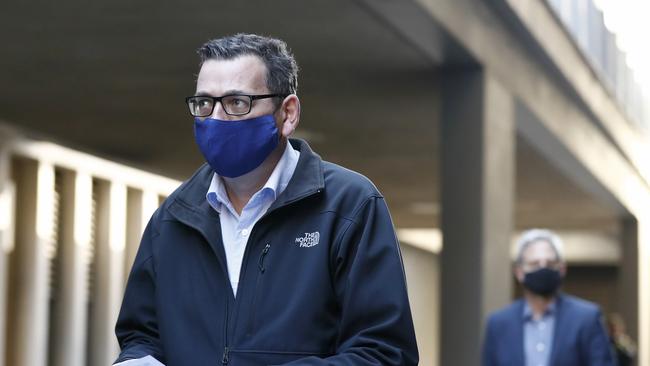
MASKS TO BE MANDATORY ACROSS METRO MELB AND MITCHELL SHIRE
Chief Health Officer Brett Sutton said a mask would now be a priority along with your keys and wallet.
Prof Sutton said masks would be mandatory for everyone over the age of 12.
Appearing at a press conference in a mask on Sunday Premier Daniel Andrews said there will be fines for people not obeying the rules.
“I understand this is a big shift and that not being able to see each other’s faces might be confronting,” he said.
“But this virus is incredibly infectious.”
The state government will be publicising instructions for a DIY mask.
Mr Andrews said masks “do not need to be hospital grade” it can be home made, a scarf or some kind of cloth face covering.
“A scarf will do,” he said.
“Because any face covering is better than no face covering.”
Prof Sutton said masks would not be mandatory in primary schools.
“It is a recommendation for everyone over the age of 12,” he said.
“That is in recognition that it’s likely to work for all of those age groups.
“Below the age of 12, it’s a consideration.
“We say not for toddlers. So not two years and below.
“It’s not a requirement in childcare. We’ve seen very, very few cases in childcare.
“But it’s a consideration for all other children.
“But it is mandatory, really from that high school age onwards.”
There will also be 3.5 million masks distributed to older and vulnerable people, possibly through GP surgeries.
Mr Andrews said there would be excuses such as running.
However, you must wear a mask while walking but can be removed once jogging.
Another example was someone being identified at a bank.
“It will be a commonsense approach,” he said.
Children under the age of 12 will be exempt and anyone with medical reasons.
If Victoria responds well, Mr Andrews said further restrictions not be introduced, such as kilometre restrictions on shopping trips.
Police union boss Sergeant Wayne Gatt said the government’s decision to make face masks compulsory was a “logical next step” in the battle against COVID-19.
“The government is doing what it can to slow the spread of the infection, obviuosly police will have a role to play in enforcing that, as they have had with all the restrictions from the very start,” Sgt Gatt said.
“We see this as a natural extension of the role police have had at the frontline supporting the community.”
He revealed the police union had not been consulted on the policy or details of its enforcement which will come into play in coming days.
Sgt Gatt said the police were focusing on supporting the community throughout the pandemic and although it was “unusual work” for officers, he didn’t expect major challenges with enforcing the face mask policy.
“We accept our members will have a role in enforcing this sort of restriction,” he said.
“The enforcement of masks, enforcement should be the last resort. I think everyone in the community should do the right thing.
“Police have been there enforcing the blatant breaches, I suspect that will be the exact same application of discretion in the initial stages. At this stage we can’t see major challenges.
NO STAGE FOUR RESTRICTIONS YET
The chief health officer said the impact of stage three restrictions was not yet reflected in the daily case numbers.
“The 2-week period from the Stage 3 restrictions hasn’t come yet, and so I think there’s still an opportunity to see those numbers drop,” he said.
“We don’t know [if and when stage four will happen].
“We have days to watch. We’ve got the new intervention. We’ve got a daily review of settings and transmission that we need to reflect on.
“We have to be ready for whatever.
“If we see that there’s a drive in transmission in a new setting in a new cohort of people with a new challenge, we’ll need to respond to it, again based on the data, based on the epidemiology.
“I’m not complacent about the fact that we’ve done enough.
“We need to watch the numbers and we need to think about whatever else is required on the basis of that day-to-day review.”
Prof Sutton said the crackdown on workplace transmission and mandatory masks would hopefully bring the numbers down.
“These settings that amplify transmission are our new target,” he said.
“And I think we are addressing transmission between homes and within homes.
“But we have a new target here, and a lot of the new numbers today will be related to those settings that we’re trying to get on top of with a new intervention.”
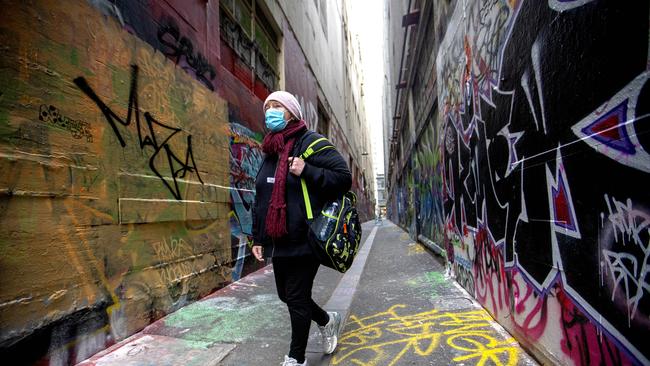
VICTORIA’S CORONAVIRUS CRISIS: BY THE NUMBERS
There are currently 166 active cases of coronavirus in healthcare workers across the state.
A total of 287 cases have been identified in residents of public housing blocks in North Melbourne and Flemington, while a total of 54 cases have been confirmed in housing blocks in Carlton.
Current outbreaks across Melbourne include:
- 169 cases at Al-Taqwa College in Truganina;
- 53 cases at Somerville Retail Services in Tottenham;
- 35 cases at JBS in Brooklyn;
- Six cases at Australian Lamb Company in Colac;
- Three cases at Australian Pharmaceuticals Industries in Dandenong;
- Six cases at Goodman Fielder Pampas in West Footscray;
- Six cases at Warringal Hospital in Heidelberg;
- 10 cases at St Basil's Home for the Aged in Fawkner;
- 38 cases at Estia Health in Ardeer;
- 24 cases at Glendale Aged Care in Werribee
- 12 cases at Embracia Aged Care Moonee Valley in Avondale Heights;
- Four cases at Japara Central Park Aged Care in Windsor;
- A single case at Bluecross Ruckers Hill in Northcote;
- A single case at Villa Maria Catholic Homes in Alphington;
- A single case at Japara Highbury in Glen Waverley.
WORKPLACES ACCOUNT FOR MAJORITY OF VIRUS TRANSMISSION
The data now shows small family transmission is not the biggest problem with peer and work contact the most common virus contact.
“About 80 per cent of our cases since May are bing driven by workplaces”, Mr Andrews said.
Victoria Police, Worksafe and Emergency Management Victoria will be carrying out checks on workplaces to ensure if 1.5m social distancing cannot be employed people are wearing masks.
At schools students and teachers will be required to wear masks where necessary.
Further announcements about supply will be made during the week.
“Any face covering is better than no face covering,” Mr Andrews said with bandannas acceptable.
“It’s an extra layer of protection but it doesn’t me we can be less vigilant.”
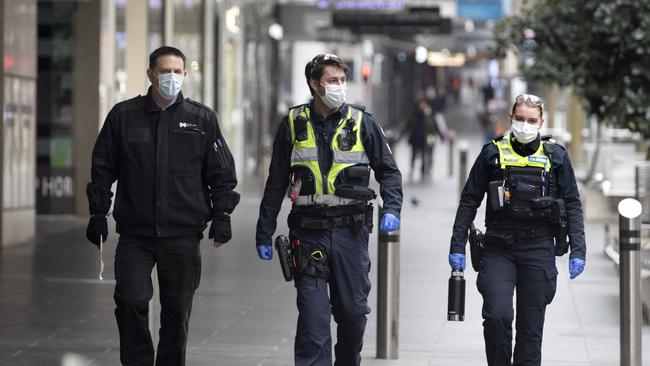
POSITIVE CASES HIT VICTORIAN PRISON SYSTEM
A female teacher who works at the Malmsbury youth justice centre has tested positive to coronavirus.
The positive test has sent the prison into lockdown.
One staffer told the Herald Sun it was “bound to happen”.
“We’re quite annoyed,” the Malmsbury staffer said.
“All the young men are locked down until further notice. They are all being tested for the virus, but we’re being given very little information.
“The staff come last all the time - we’re not being offered tests.”
Prof Sutton confirmed the case would require contact tracing.
Another positive test has been confirmed at the Parkville Youth Justice Centre.
At least three staff have been told not to report for work.
It is believed inmates have been locked down as management tries to control the spread.
Authorities had been desperate not to let coronavirus into the system.
Staff have been temperature tested before shifts.
It is not known what effect the situation will have on visits or whether families of those detained have been notified.
Prof Sutton said on Sunday single cases of coronavirus had been diagnosed in some youth justice and remand centres, but the cases were isolated and not deemed to be a risk to anyone else.
Prof Sutton is expected to release comprehensive details of Sunday’s new cases later in the day.
It was revealed this week that the first cases had been recorded in the state’s adult jails.
- Mark Buttler and Brianna Travers
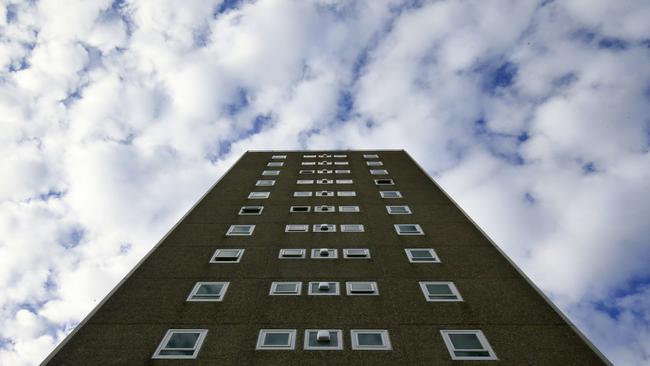
FURTHER RESTRICTIONS IN AGED CARE FACILITIES
Three new outbreaks at aged care facilities are among Sunday’s new cases, with further details expected to be released by the chief health officer on Sunday afternoon.
It comes as new restrictions were announced in aged care facilities, limiting visits to one hour.
Health Minister Jenny Mikakos announced the State of Emergency had also been extended until August 16 “because we know our coronavirus fight is not over”.
To minimise the risk of further spread in ages care facilities, the state and federal government have unveiled a financial package for employers to “minimise the movement of workers across facilities”.
“We know that we have a transcient workforce in many cases, a casualised workforce, working across many aged care facilities,” Ms Mikakos said.
“We have seen specific instances in recent days of staff who have worked across multiple facilities and then we have had multiple outbreaks across those facilities.
“Other parts of the package will also involve more infection control training that will be provided by our Government to ensure that aged care facilities are well equipped and understand their obligations around infection control.
“The Commonwealth is now going to be provides face masks for staff across all aged care facilities, not just in the hot spot areas, but making sure that staff have the PPE that they need working in the vulnerable setting.”
The package will cover additional entitlements and any worker who does not have access to leave entitlements they can access a $1500 hardship payment of required to isolate.
PARTYGOERS AND FISHERMAN AMONG FINE RECIPIENTS
Thirty people at a Kyabram house party are among the disobedient Victorians not staying at home.
Police issued a total of 127 fines for breaching the orders of the Chief Health Officer to stay at home over the past 24 hours.
Of the Kyabram partygoers, nine penalties were issued to adults who were present at the private residence.
Another disobedient Victorian was a Keilor Downs man who planned to go fishing on the peninsula. He was intercepted and fined $1652 when police pulled him over in Langwarrin.
- Brianna Travers
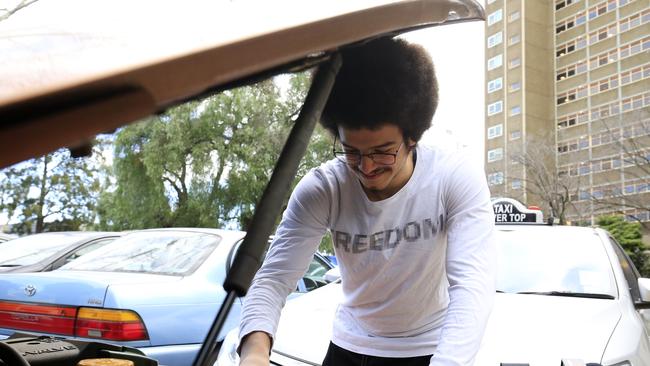
RELIEF FOR TOWER RESIDENTS AS HARD LOCKDOWN ENDS
Public housing residents in North Melbourne are relieved to have the same freedoms as the rest of the city as their 14 days of hard lockdown today came to an end.
Residents at 33 Albert Street can now leave their homes for food, medicine, exercising, study and work like the rest of Melbourne after the enforced shut-down began on July 4.
18-year-old Ali Abdalla said he spent the two-week stint with his mother in their apartment on the 11th floor of the Albert Street tower, and it was a relief to set foot out of their home.
“We finally have our freedom, it is awesome to be outside”, Mr Abdalla said.
Today donning a white shirt with the word “freedom” stretched across the front, the architecture and engineering student praised efforts by the Victorian government to help feed and provide medical care for the tower’s residents.
“They were very helpful and got us everything we needed”, he said.
But, Mr Abdalla said the confinement away from family while trying to keep entertained was the most difficult part of isolation.
“The worst part about it was the fact that you are in one space, away from family, being restricted from them”, Mr Abdalla said.
“It was a matter of finding something to do and keeping in touch with family”, he said.
“We did anything we could, like going online or studying”, he said.
With police presence wound back to several officers circling the Alfred Street block, 67-year-old Bilma Albarenga said a sense of quiet normal has returned to her street.
Originally from Spain, Ms Albarenga has lived in the Albert Street towers for more than 20 years.
Ms Albarenga said she struggled with being confined to her flat, relying on deliveries of frozen food to eat.
“It was not what I was used to eating, but the people outside were very kind and helpful trying to feed us”, she said.
Carting a trolley towards the street, Ms Albarenga said her first plan was to buy her own groceries for the first time in two week.
“It is a relief to be able to walk around and shop for myself”, she said.
Ms Albarenga said her newfound freedom was welcome news, but said the strict lockdown was needed because Melburnains on the outside are still not grasping how quickly coronavirus can spread.
“For people still out there doing things like normal, stay inside”, Ms Albarenga said.
“Look [at] what happened here”, she said.
While residents are today relieved to be allowed out of the tower, Victoria’s ombudsman is investigating the hard lockdown of 33 Albert Street, along with eight other towers that were shut down for five days earlier in July.
One third of the tower’s occupants will still have to remain in isolation until they are completely cleared of the virus, whether they contracted it themselves or came into close contact with residents who returned a positive test.
- Olivia Jenkins
CONTACT TRACING DEMANDS OVERWHELMING SYSTEM
Up to 1000 Victorians who either have coronavirus or could be a close contact with someone who has tested positive may have slipped through the cracks of the state’s besieged contact tracing system in the past week.
As investigators struggle to cope with surging outbreaks, the Sunday Herald Sun can reveal there are cases where COVID-19-positive people have waited up to five days before being asked to identify close contacts they may have spread the virus to.
Public health sources have revealed the details of 1000 Victorians deemed to be a positive case or one of their close contacts have not been placed in the contact tracing system in the past week.
It is understood many of the cases may have been contacted and undergone contact tracing interviews, however backlogs have meant details such as their movements and close contacts have not been recorded.
Contact tracing investigations are required to identify people exposed to coronavirus so they can be isolated before they pass the virus on to others.
In one case a Melbourne childcare centre had to close after learning a staff member had been at work while potentially infectious, but had been left waiting more than a week for any contact tracing to take place.
Guardian Childcare & Education chief executive officer Warren Bright said his centres were doing everything to support the Department of Health and Human Services, but were worried by delays.
“We are becoming increasingly concerned about the significant delays we are seeing between the receipt of a positive test result and the start of contact tracing,’ Mr Bright said.
“In one of our centres we are now at day eight since being notified of a positive test result and tracing still hasn’t commenced.
“We understand it took five days for DHHS to contact the infected person.
“This means the centre has remained closed and families have been given no indication whether they should self isolate or not, obviously increasing the risk to the community.”
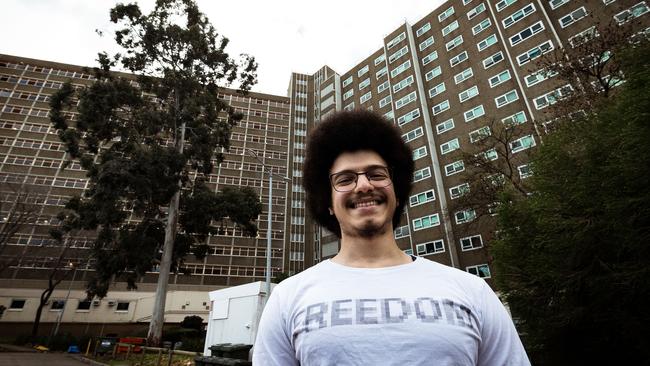
After drafting in interstate workers, commonwealth public servants, corporate call centre employees and Australian Defence Force personnel in recent weeks, Premier Daniel Andrews said Victoria’s contact tracing team was now more than 2000 strong.
“The task is very big and it does take time to get to people,” Mr Andrews said.
“It is a bigger team, but the task has never been bigger as well.
“Sadly, there will always be instances where, despite multiple phone calls, you can’t connect with a person. Despite every best effort you can’t quite get that full interview done at the first instance at exactly the right time.
“Regardless of whether you receive detailed instructions within minutes or hours of been told you are positive, that won’t change the fact that you need to go home and you need to stay home.“
But State Opposition health spokeswoman Georgie Crozier said contact tracing failures were undermining the community’s efforts to stop the spread of coronavirus.
“The basics haven’t been done and, as a result, Victorians feel let down by the administrative failures of the Andrews Labor Government,” Ms Crozier said.
CASE RISE COULD SHUT REGIONS
Health authorities are growing increasingly concerned about regional coronavirus cases as they race to shut down outbreaks in central and southwestern Victoria.
Two regional aged care centres were found with cases on Saturday — the Mercy Health Bethlehem Home for the Aged in Bendigo and the Bill Crawford Lodge in Ballarat.
The positive test by a meat worker at Australian Lamb in Colac last week has contact tracers bracing for further outbreaks in high-risk abattoirs.
The Sunday Herald Sun can reveal that the state opposition will call on the government to stop recruiting regional Corrections Victoria staff to help fix the Melbourne hotel quarantine system so as to limit the risk of the virus spreading in country areas.
Opposition police and corrections spokesman David Southwick has written to Corrections Minister Natalie Hutchins to call for a rethink on the policy given “there remains a heightened risk of staff contracting the virus and potentially spreading it to regional communities upon their return home”.
Mr Southwick saidgetting officers to come into known areas of contamination was asking for trouble.
“The use of regional officers in known COVID-19 hot spots opens the door to spreading this virus to regional communities and this practice must be stopped immediately,” he said.
Premier Daniel Andrews said while COVID-19 infections in regional centres were relatively low, a lot of work was going into trying to “lock down” any that might be found.
There have been 324 region cases while Melbourne has almost 5000.
Health Minister Jenny Mikakos said a ged care facility outbreaks had previously been contained to Melbourne and the regional spread “just highlights the fact that all Victorians need to be vigilant”.
With Stage 3 restrictions in Melbourne and Mitchell Shire, there are fears a continual spread to country areas would expand the number of areas with limits on movements.
More cases are likely from the Colac meat worker with locals saying some of the worker’s relatives have already received positive tests.
Mr Andrews has previously called on regional Victorians to wear masks where it isn’t possible to practice social distancing.
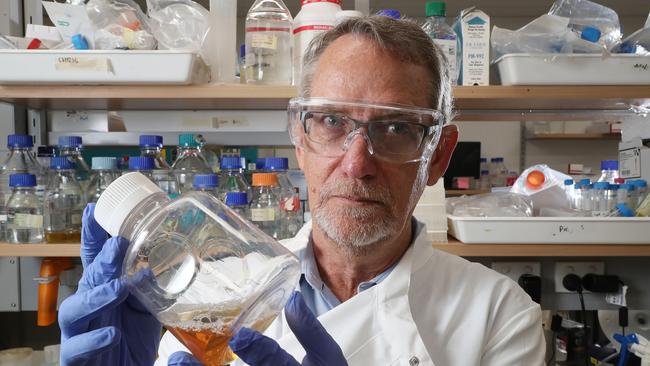
AUSSIES TO GET FIRST DIBS WITH VACCINE
Australia is gaining ground in its race for a coronavirus cure, as human trials of a drug tested on Victorian animals begins and a new deal guarantees millions of vials of vaccine.
Overseas human trials of a vaccine tested on ferrets at Geelong’s Australian Centre for Disease Preparedness (ACDP) have begun.
“I believe the Oxford vaccine is now in phase three (of trials), which means it is being deployed in areas where the virus is circulating … deployed in a small number of people who are being carefully monitored,” ACDP director Trevor Drew said.
It has also been revealed that Australians will skip the queue for free COVID-19 flu shots after the Queensland Government signed a deal to stockpile 100 million vials of any vaccine developed by the University of Queensland. Enough doses will be set aside for every Australian if a vaccine is produced next year.
Prof Drew said scientists at the CSIRO’s ACDP were in a race against time to understand how coronavirus was spreading, why some people became more ill than others and how long it survived outside the body.
As one of just six high-containment animal research labs in the world, the Geelong ACDP works with some of the deadliest pathogens and zoonotic diseases, which are those transferred from animals to people.
It has led the way on research into bats and how they can carry diseases that are fatal to other animals and humans, but do not become ill themselves.
Soon to be published ACDP research on the way coronavirus could spread through materials and surfaces reinforced the need for Victorians to be vigilant in not touching items in shops and then touching their faces — including their eyes, Prof Drew said.
It also reinforced the need to constantly wash hands and sanitise surfaces.
“Only go out if you absolutely have to and reduce the times you shop to the absolute minimum,” he said.
Immunology leader at the Doherty Institute, Dale Godfrey, added that wearing face masks was important.
Because coronavirus thrived in cold air, mutating and returning with a vengeance in Victoria’s winter, the need for a vaccine and further investigation of potentially effective treatments such as corticosteroids — which suppressed the immune system — was urgent.
Recent “variations” in the virus could mean it was more infectious than ever, Prof Godfrey said.
“The different mutations of the virus is hundreds, if not thousands, of subtle different variations … the bottom line is we really don’t know why it is spreading so aggressively this time in Victoria … it could be a combination of things,” he said.
Globally, up to 30 potential vaccines were already in clinical trials as scientists worked around the clock to understand and prevent the spread of COVID-19, Prof Godfrey said.
“Six years’ work has been done in six months,” he said.
“That’s mind-boggling and something we never would have believed was possible.
“It comes from a worldwide collaborative effort … from global recognition that this is a serious pandemic and everyone has to make things move as fast as possible.”
RAIL OPERATORS ‘GOING BROKE’
Melbourne’s rail operators could ask the government for more money by the end of the year as extended lockdowns cut their income.
The Sunday Herald Sun believes the return of movement restrictions has sparked fresh financial concerns at Yarra Trams and Metro Trains, and one source said “they’re telling people they’re going broke again”.
In May, both companies received up to $20 million in State Government support as they kept full timetables but patronage plummeted.
The loss of revenue was so severe that they were said to be ready to hand back the keys to the business if a solution was not found.
The companies have not asked for a second round of stimulus payments but the loss of up to a million dollars a week in revenue has sparked talk that they will need more support by the end of the year.
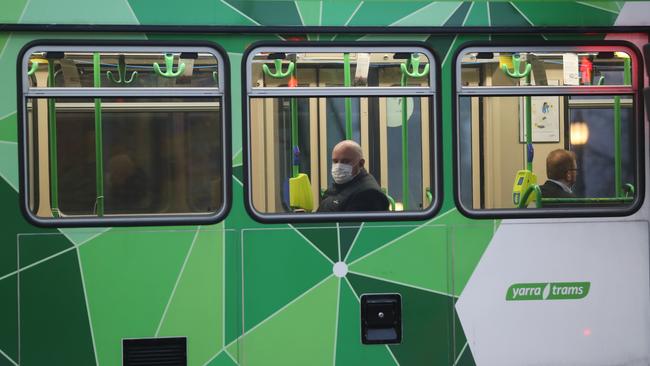
Passenger numbers are expected to remain close to 10 per cent of normal until at least September and there are long-term concerns that COVID-19 will keep many people away from public transport until a vaccine is found.
A Yarra Trams spokesman said the previous financial support package had provided certainty during the pandemic.
“Yarra Trams has not been immune to the effects of coronavirus, and we are grateful for the support we have received from the State Government,” he said.
A Metro spokesman said the company employed more than 6200 people, who ensured essential workers and others could go to work, shop or seek medical help.
“The Victorian Government deserves credit for supporting jobs, keeping public transport running and adding additional services for those who rely on them,” he said.
Public Transport Minister Ben Carroll said the network helped move frontline workers: “We’re continuing to work with our operators to support the thousands of Victorians who work across the network,” he said.
MORE NEWS:
WHY EXPERTS ARE PUSHING FOR STAGE 4 LOCKDOWN
